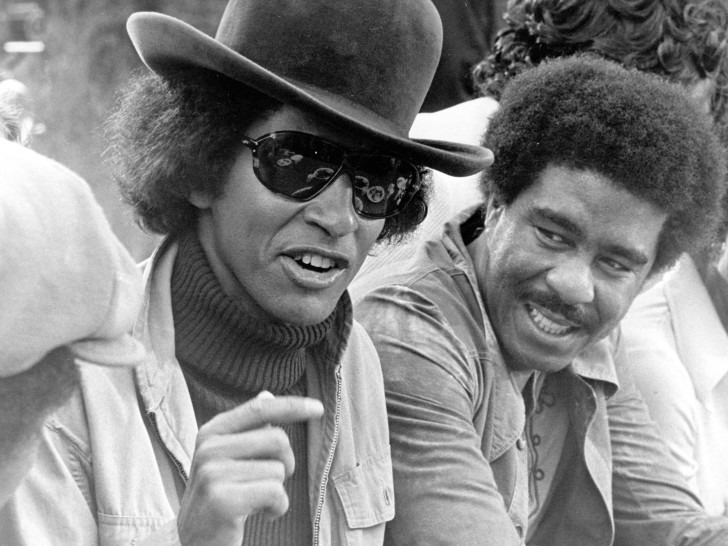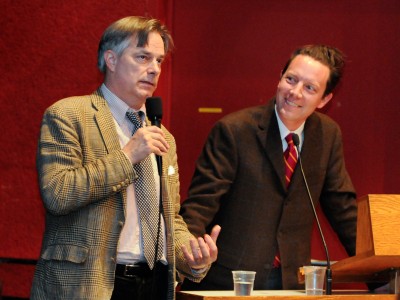
The Mack introduction by Jeremy Rossen.
Transcript
John Quackenbush 0:00
[PERCUSSIVE MUSIC IN BACKGROUND]
November 18, 2016. The Harvard Film Archive screened The Mack. This is the audio recording of the introduction by HFA junior curator, Jeremy Rossen.
Jeremy Rossen 0:15
All right. Good evening, ladies and gentlemen. Jeremy Rossen, assistant curator here at the Harvard Film Archive, welcoming you back, as we continue on in our series "Say It Loud!" Just wanted to give a little backstory on tonight's film, The Mack, Michael Campus's film from 1973. Because I think, on the surface, lots of things get lost, but there's some interesting backstory to the film, I think, that'll be good to list before we go into the film tonight.
Far from being one of the many cliched blaxploitation movies that only serves the purpose of historical parody, The Mack is, in fact, a narrative that combines nuances of African-American folklore with the ambitions of Horatio Alger. Michael Campus, the director of The Mack, believed “It was a slice of life, a fragment of life in America at the time. And I think the power of the film is the fact that we told the truth.” Pimpin’ ain't easy, as the saying goes, and no film better illustrates this, the glamour and the downside of this world, than The Mack. It's part, part gritty urban realism, part male fantasy. The Mack is based on the life of Frank Ward, who was, at the time, one of the most successful African-American drug dealers and pimps at the time. It was the Ward brothers, him and his three brothers. And they provided guidance and protection to Michael Campus and the crew, and permission to film in Oakland, which was what he considered "territory." But through that permission, he gave them amazing access to all the underground clubs and all the authentic locations that they used. In exchange, there's one catch, obviously, is that he got a small role in the film. And so Max Julien, who plays Goldie, is kind of, is based around Max Ward, is based around his character. But of course, during the filming, they ran into a series of problems.
So during the film, the Black Panthers didn't take too kindly, there was kind of a turf war at the time between the Black Panthers and the Ward brothers. And in the middle of filming, the Ward brothers, Frank Ward, who was the leader, was killed by the Black Panthers. And the, and the director, Michael Campus, had to sit down with the Black Panthers, and Bobby Seale, and pay them $5,000 to continue to film. So the problem was, they wrote him a check which bounced. And that obviously created problems when they tried to film, because the next day, when they were filming, they were throwing bottles from the rooftops onto the set. And so they had to actually go back and write a real check. And not only that, they had to promise that the first week of profits from the screening would be donated to the Black Panthers. So at the time, The Mack was the most, was the box-office hit at the time, and they donated all the money to the Black Panthers. So, other things of note. Max Julien, who is in tonight's film, also wrote the screenplay for the film that hopefully some of you will stick around for afterwards, Cleopatra Jones. He wrote the screenplay for that. And I also note that Cleopatra Jones is a beautiful 35 millimeter IB Technicolor print. So in case you were on the fence about staying or not, please stay. It'll be worth your time, I promise. Tonight's film, as well, is, a couple other notes. This is the original score by Willie Hutch, from 1973. The film was rereleased in the early 80s. And that, that score features Alan Silvestri and Gene McDaniels, and I think it really does the film a disservice. And so we didn't want to show that rereleased version from the 80s. With the Willie Hutch score, it's synonymous with the film, and there's no way to show it without it. So there's really no prints of this in existence, really, anymore. We found a 16 millimeter print from a film archive in Germany. And that's what we'll be showing tonight. So there is some wear on the print, but it's still, it's still a beautiful vintage print. And I think it's, it's, it's, obviously, it's much better than the DVD. So with that, I'll just get into it. So there's a quick turnaround. Thank you for coming out. And please stick around afterwards for Cleopatra Jones.
[PERCUSSIVE MUSIC RESUMES]
Unknown speaker 5:45
This was recorded live at the Carpenter Center at Harvard University. For more recordings and information about Harvard events and our collection, please visit us at harvardfilmarchive.org
© Harvard Film Archive
Related film series
Explore more conversations
Whit Stillman

Eloy Enciso Cachafeiro

Jill Janows

Michael Roemer

